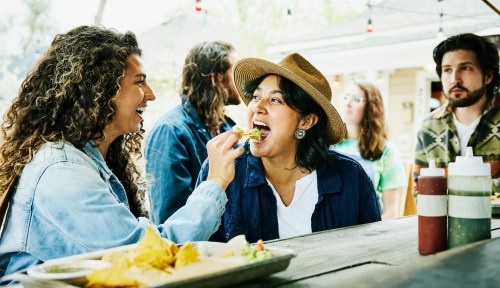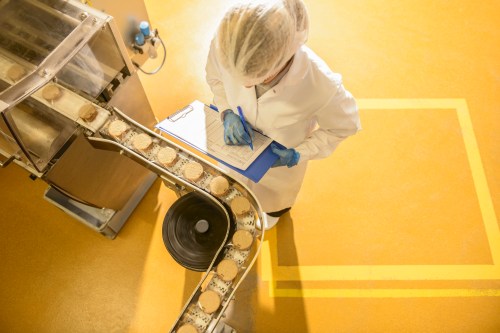You just polished off a delicious dinner at an outdoor restaurant with a friend and you’re lingering over a post-meal cup of tea (or cocktail) when it hits you: You have to poop. The poop sweats begin, your lower tummy starts to rumble, and before you know it, you’re mentally mapping out the quickest way to the bathroom. Among the questions you’re asking yourself (like, “How do I end this meal ASAP without being rude?” and “Does this place have single stalls?”) is this one: Why do I have to poop right after I eat?
Experts in This Article
registered dietitian and gut health expert
chief gastroenterologist at Mohawk Valley Endoscopy Center
nutritionist and creator of The Candida Diet
You can chalk it up to the gastrocolic reflex, which is something gut-health registered dietitian Amanda Sauceda, RD has talked openly about on Instagram. “The gastrocolic reflex is the fancy-pants name for having to [poop] after you eat,” Sauceda wrote on the post, and in an interview with Well+Good, she assures that it’s typically a normal part of healthy digestion. It’s often more active in the morning and immediately after meals, per the National Library of Medicine (NLM).
According to Sauceda, the stomach stretches after eating, which triggers the gastrocolic reflex to push more food out of the colon to make room. “That natural process is you having to poop after you eat,” she says. It’s triggered by hormones called cholecystokinin and motilin, which help your intestine muscles contract and move food through your GI tract. “Your body is making room for more food so your colon says ‘heave-ho’ to whatever is inside and you get the urge to poop.”
Read on to learn more about what triggers the gastrocolic reflex, conditions that may heighten it, and when to see a doctor about your gut health concerns.
Symptoms of heightened gastrocolic reflex
Gastrocolic reflex is normal, but some people can get diarrhea after eating, which is indicative of a heightened gastrocolic reflex, according to Dr. Allen. This may be especially true if your diarrhea is not caused by other things like foodborne illnesses, bacteria, or other GI concerns.
Along with diarrhea, people with a heightened gastrocolic reflex can also get the following, per Dr. Allen:
- Stomach pain
- Bloating
- Flatulence
- Frequent bowel movements after eating
- In some cases, constipation
Dr. Allen also says these heightened gastrocolic reflex symptoms can be associated with irritable bowel syndrome, or IBS—but no matter the cause, they can be uncomfortable. And they might pose a problem if you’re, say, in a restaurant or at a dinner party.
While there’s no shame in having to poop when duty calls, your first impulse might be to keep it in until you’re in the privacy of your home. But holding in your poop is never the solution—and thankfully, it isn’t the only solution to ease the discomfort that can come with a heightened gastrocolic reflex (more on this later).
Foods that trigger the gastrocolic reflex
Sauceda says some food and drinks often make people have to go quicker than other types of food. A large meal or one high in fat can speed up the workings of your digestive system. Harvey Hamilton Allen Jr., MD, chief gastroenterologist at Mohawk Valley Endoscopy Center, echoes Sauceda’s sentiment, adding that ultra-processed food and carbohydrates can also trigger the gastrocolic reflex.
Some other foods that can speed up your gastrocolic reflex are also those that trigger IBS issues. This can include the following, per Johns Hopkins Medicine:
- Milk
- Foods high in fructose (sweets, apples, pears, dried fruit, etc.)
- Carbonated beverages
- Cruciferous vegetables (broccoli, cabbage, cauliflower)
- Beans
- Acidic foods
Coffee can also make you want to poop, thanks to its caffeine content and a few other factors, though Sauceda says that in some people, the gut-friendly drink has the opposite effect and causes constipation. That said, Dr. Allen posits that every body is different, and what might make you want to poop instantly might not necessarily apply to another person.
Plus, the food you just ate isn’t what makes you poop instantly, which is a common myth that Sauceda has encountered among clients. “This is not the case,” she says, explaining that it’s actually the body making room for what you just ate by emptying out what has already been digested earlier. This may also make it difficult to know exactly which foods to avoid with gastrocolic reflex.
Conditions that affect gastrocolic reflex
As mentioned above, IBS is often associated with a heightened gastrocolic reflex—meaning it may cause you to poop more quickly after eating. This can be caused by the increase in intestinal contractions that come with IBS, nerve hypersensitivity between the brain and gut, or changes in your gut’s microbiome, per the Mayo Clinic. It could even be from elevated levels of cholecystokinin after eating, which has been associated with IBS, according to a March 2014 review in Gastroenterology & Hepatology1.
Another condition associated with heightened gastrocolic reflex is called idiopathic dumping syndrome—where your stomach empties contents into your small intestine more quickly than it should, per the Cleveland Clinic. This can result in pooping more quickly after eating, too, along with other symptoms like abdominal pain, hypotension, and dizziness, per the NLM.
On the opposite end of the spectrum, your gastrocolic reflex can slow down with certain conditions that affect your nervous system, like diabetic neuropathy, for example. This type of nerve damage can lead to a condition called gastroparesis—or a delayed emptying of the contents in your stomach, per the NLM. Constipation is the most common symptom of slowed gastrocolic reflex.
How to calm gastrocolic reflex symptoms
Dr. Allen says that there are things you can do to calm heightened gastrocolic reflex symptoms:
Change up your meals
If you get diarrhea or frequently have bowel movements after every meal, “eat small meals,” he says—and conversely, avoid eating super fatty meals, meals loaded with carbohydrates, or highly processed foods, which can all distend the stomach, triggering one’s urge to to use the bathroom.
Pay attention to your trigger foods
Additionally, “pay attention to the foods that trigger you most,” he says. “Some people will eat very spicy foods and that will trigger [the reflex], while others can eat spicy foods with no consequences.” Knowing this information can help, particularly if you often find yourself having to poop after every meal.
Try probiotics
Dr. Allen also mentions there have been a few studies that show normalizing the colonic flora can help regulate the trigger response of a heightened gastrocolic reflex. How to normalize your colonic flora? “Take probiotics,” says Dr. Allen. Probiotics can help the gut digest food and break down nutrients, and typically the best time to take probiotics is before a meal or right before you begin a meal.
“Taking your probiotics at this time will make their passage to your gut a little easier and ensure you get the most from those beneficial bacteria,” Lisa Richards, CNC, nutritionist and creator of the Candida Diet, previously told Well+Good. But as with any supplement, it’s best to talk to your doctor before including probiotics in your supplement routine.
Manage stress
Your stress response could be causing your bowels to move in overdrive, especially if you have IBS, per the Mayo Clinic. This means finding stress-management techniques that you enjoy—like yoga, meditation, or journaling—could be helpful in not only slowing down your mind, but your gut, too.
See your doctor
With all this in mind, if you have the persistent urge to poop after every meal or frequently get stomach pains or diarrhea after eating, Dr. Allen recommends seeing a doctor who can rule out whether it’s associated with IBS or other medical issues. They can also provide you with an appropriate gastrocolic reflex treatment plan, which might include prescription medicine for gastrocolic reflex.
Some commonly prescribed medications include antispasmodics (which reduce intestinal contractions), tricyclic antidepressants, and SSRI antidepressants, per the NLM. They may also prescribe antibiotics if they suspect an infection is present.
The bottom line
Your gastrocolic reflex is a normal part of digestion and helps keep your bowels moving after you eat. That said, if you find your urge to go is persistent, disruptive, and comes with other symptoms like pain or diarrhea, you may have a heightened gastrocolic reflex triggered by an underlying health condition or certain food choices. If you think this is your case, reach out to your doctor. They can help you get to the root of the issue.
FAQ
Is gastrocolic reflex in adults normal?
“Most of the time, people wonder if the gastrocolic reflex is bad, but it’s a normal reflex that the body helps food move along,” says Dr. Allen, and for some people having to use the bathroom multiple times per day or less frequently is normal.
But if you notice a significant change in your bowel movements, often have diarrhea, stomach pains, bloating, or are pooping after every meal, he says you may want to check in with a medical professional. “A lot of different things can cause these [symptoms] and there are also a lot of different treatments,” he says, and often a doctor would know how to best address them.
How do you control a gastrocolic reflex?
There are a few things you can do to calm a heightened gastrocolic reflex. If a heightened gastrocolic reflex causes you stomach pain, Dr. Allen says that drinking a warm cup of tea can help alleviate the hurt. Gut-healthy teas, like peppermint tea can soothe the stomach by preventing stomach muscle contraction2 and chamomile tea comes with the recommendation of Dr. Allen for its calming properties.
He underscores, however, that drinking tea doesn’t necessarily solve the issues that come with a heightened gastrocolic reflex but rather, assuages some painful symptoms, like contractions or stomach spasms. Additionally, he mentions that drinking a glass of water or standing up from your seat can help, too.
What foods are commonly associated with gastrocolic reflex?
There are a few foods and drinks that can commonly trigger your gastrocolic reflex, like foods that are high in or carbohydrates as well as processed foods. Having a large meal can also trigger your bowel movements. Some people, but not all, may also have the urge to go to the bathroom after drinking coffee.
But every person’s gastrocolic reflex triggers are unique. For instance, some people who eat spicy foods will have to poop right after their meal, while others can take the heat without having to bear the consequences. All that is to say, if you want to know what makes you poop instantly, it’s important to pay close attention to what you eat and how it affects you.
—reviewed by Jennifer Logan, MD, MPH
Hayes, Paula A et al. “Irritable bowel syndrome: the role of food in pathogenesis and management.” Gastroenterology & hepatology vol. 10,3 (2014): 164-74.
↩︎Chumpitazi, B P et al. “Review article: the physiological effects and safety of peppermint oil and its efficacy in irritable bowel syndrome and other functional disorders.” Alimentary pharmacology & therapeutics vol. 47,6 (2018): 738-752. doi:10.1111/apt.14519
↩︎
Sign Up for Our Daily Newsletter
Get all the latest in wellness, trends, food, fitness, beauty, and more delivered right to your inbox.
Got it, you've been added to our email list.










